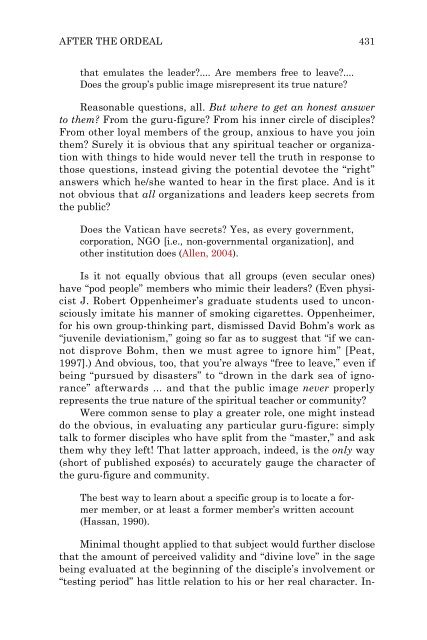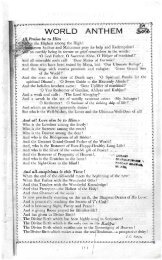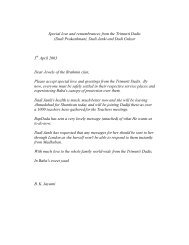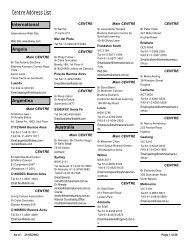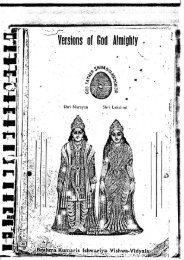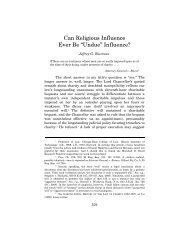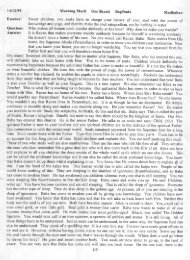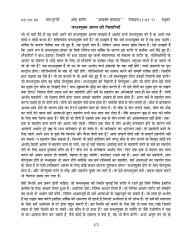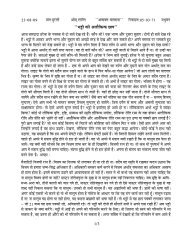- Page 2 and 3:
STRIPPING THE GURUS Sex, Violence,
- Page 4 and 5:
STRIPPING THE GURUS Sex, Violence,
- Page 6 and 7:
CONTENTS Introduction .............
- Page 8 and 9:
INTRODUCTION ONE OF MY DEAR, late m
- Page 10 and 11:
INTRODUCTION vii This text may, how
- Page 12 and 13:
CHAPTER I SPEAK NO EVIL The wicked
- Page 14 and 15:
SPEAK NO EVIL 3 • Bhagwan Shree R
- Page 16 and 17:
SPEAK NO EVIL 5 how they could ever
- Page 18 and 19:
A BIT OF A BOOBY 7 is an East India
- Page 20 and 21:
A BIT OF A BOOBY 9 like” (in Nikh
- Page 22 and 23:
A BIT OF A BOOBY 11 [W]hile regardi
- Page 24 and 25:
THE HANDSOME DUCKLING 13 plines, he
- Page 26 and 27:
THE HANDSOME DUCKLING 15 Plans! Pla
- Page 28 and 29:
CHAPTER IV THE KRINSH (JIDDU KRISHN
- Page 30 and 31:
THE KRINSH 19 dropped “precipitat
- Page 32 and 33:
THE KRINSH 21 [The Nobel-caliber ph
- Page 34 and 35:
THE KRINSH 23 Krishnamurti had occa
- Page 36 and 37:
THE KRINSH 25 [T]he physicist was t
- Page 38 and 39:
THE KRINSH 27 body for many hundred
- Page 40 and 41:
CHAPTER V ZEN IN THE ART OF SEX AND
- Page 42 and 43:
ZEN IN THE ART OF SEX AND VIOLENCE
- Page 44 and 45:
ZEN IN THE ART OF SEX AND VIOLENCE
- Page 46 and 47:
ZEN IN THE ART OF SEX AND VIOLENCE
- Page 48 and 49:
ZEN IN THE ART OF SEX AND VIOLENCE
- Page 50 and 51:
ZEN IN THE ART OF SEX AND VIOLENCE
- Page 52 and 53:
ZEN IN THE ART OF SEX AND VIOLENCE
- Page 54 and 55:
ZEN IN THE ART OF SEX AND VIOLENCE
- Page 56 and 57:
SEX, BLISS, AND ROCK ‘N’ ROLL 4
- Page 58 and 59:
SEX, BLISS, AND ROCK ‘N’ ROLL 4
- Page 60 and 61:
CHAPTER VII THE SIXTH BEATLE (MAHAR
- Page 62 and 63:
THE SIXTH BEATLE 51 tered though th
- Page 64 and 65:
THE SIXTH BEATLE 53 The Beatles ...
- Page 66 and 67:
THE SIXTH BEATLE 55 manent location
- Page 68 and 69:
THE SIXTH BEATLE 57 Such critical a
- Page 70 and 71:
THE SIXTH BEATLE 59 The TM movement
- Page 72 and 73:
BEEN HERE, DONE THAT, WHAT NOW? 61
- Page 74 and 75:
BEEN HERE, DONE THAT, WHAT NOW? 63
- Page 76 and 77:
BEEN HERE, DONE THAT, WHAT NOW? 65
- Page 78 and 79:
CHAPTER IX SCORPION-MAN (SATYA SAI
- Page 80 and 81:
SCORPION-MAN 69 It is believed that
- Page 82 and 83:
SCORPION-MAN 71 When all the others
- Page 84 and 85:
CHAPTER X EVEN IF IT HAPPENED.... (
- Page 86 and 87:
EVEN IF IT HAPPENED.... 75 * * * As
- Page 88 and 89:
CHAPTER XI MO’ CHIN-UPS (SRI CHIN
- Page 90 and 91:
MO’ CHIN-UPS 79 simultaneous jogg
- Page 92 and 93:
MO’ CHIN-UPS 81 Some of his follo
- Page 94 and 95:
CHAPTER XII THAI SURPRISE Confucius
- Page 96 and 97:
THAI SURPRISE 85 There was the Budd
- Page 98 and 99:
BATTLEFIELD TEEGEEACK 87 [Scientolo
- Page 100 and 101:
BATTLEFIELD TEEGEEACK 89 Yet, the l
- Page 102 and 103:
BATTLEFIELD TEEGEEACK 91 The follow
- Page 104 and 105:
BATTLEFIELD TEEGEEACK 93 More recen
- Page 106 and 107:
CHAPTER XIV WERNER’S UNCERTAINTY
- Page 108 and 109:
WERNER’S UNCERTAINTY PRINCIPLE 97
- Page 110 and 111:
CHAPTER XV COCKROACH YOGA (YOGI BHA
- Page 112 and 113:
COCKROACH YOGA 101 head of an ashra
- Page 114 and 115:
COCKROACH YOGA 103 In another ten y
- Page 116 and 117:
A WILD AND CRAZY WISDOM GUY 105 In
- Page 118 and 119:
A WILD AND CRAZY WISDOM GUY 107 con
- Page 120 and 121:
A WILD AND CRAZY WISDOM GUY 109 but
- Page 122 and 123:
A WILD AND CRAZY WISDOM GUY 111 Fin
- Page 124 and 125:
A WILD AND CRAZY WISDOM GUY 113 In
- Page 126 and 127:
A WILD AND CRAZY WISDOM GUY 115 Int
- Page 128 and 129:
A WILD AND CRAZY WISDOM GUY 117 In
- Page 130 and 131:
A WILD AND CRAZY WISDOM GUY 119 ple
- Page 132 and 133:
SIXTY MINUTES 121 To aid his world
- Page 134 and 135:
SIXTY MINUTES 123 2002, to teach. L
- Page 136 and 137:
CHAPTER XVIII THE MANGO KID (BHAGWA
- Page 138 and 139:
THE MANGO KID 127 Rajneesh has said
- Page 140 and 141:
THE MANGO KID 129 And thereby was t
- Page 142 and 143:
THE MANGO KID 131 Rajneesh, as the
- Page 144 and 145:
CHAPTER XIX DA AVATAR, DA BOMB, DA
- Page 146 and 147:
DA AVATAR, DA BOMB, DA BUM 135 duce
- Page 148 and 149:
DA AVATAR, DA BOMB, DA BUM 137 In l
- Page 150 and 151:
DA AVATAR, DA BOMB, DA BUM 139 Jone
- Page 152 and 153:
DA AVATAR, DA BOMB, DA BUM 141 [B]o
- Page 154 and 155:
DA AVATAR, DA BOMB, DA BUM 143 sigh
- Page 156 and 157:
DA AVATAR, DA BOMB, DA BUM 145 In 1
- Page 158 and 159:
DA AVATAR, DA BOMB, DA BUM 147 dest
- Page 160 and 161:
DA AVATAR, DA BOMB, DA BUM 149 Sal
- Page 162 and 163:
SOMETIMES I FEEL LIKE A GOD 151 int
- Page 164 and 165:
SOMETIMES I FEEL LIKE A GOD 153 nat
- Page 166 and 167:
SOMETIMES I FEEL LIKE A GOD 155 [O]
- Page 168 and 169:
SOMETIMES I FEEL LIKE A GOD 157 or
- Page 170 and 171:
SOMETIMES I FEEL LIKE A GOD 159 res
- Page 172 and 173:
SOMETIMES I FEEL LIKE A GOD 161 Rin
- Page 174 and 175:
SOMETIMES I FEEL LIKE A GOD 163 pub
- Page 176 and 177:
SOMETIMES I FEEL LIKE A GOD 165 If
- Page 178 and 179:
SOMETIMES I FEEL LIKE A GOD 167 For
- Page 180 and 181:
NORMAN EINSTEIN 169 the four great
- Page 182 and 183:
NORMAN EINSTEIN 171 Not even the Da
- Page 184 and 185:
NORMAN EINSTEIN 173 ing opinions ar
- Page 186 and 187:
NORMAN EINSTEIN 175 If about a doze
- Page 188 and 189:
NORMAN EINSTEIN 177 Ironically, Wil
- Page 190 and 191:
NORMAN EINSTEIN 179 (1982), off-bas
- Page 192 and 193:
NORMAN EINSTEIN 181 ments, on which
- Page 194 and 195:
NORMAN EINSTEIN 183 If Wilber think
- Page 196 and 197:
NORMAN EINSTEIN 185 to be the energ
- Page 198 and 199:
NORMAN EINSTEIN 187 vouches for the
- Page 200 and 201:
NORMAN EINSTEIN 189 would mean that
- Page 202 and 203:
NORMAN EINSTEIN 191 It is no large
- Page 204 and 205:
NORMAN EINSTEIN 193 astral spine. T
- Page 206 and 207:
NORMAN EINSTEIN 195 Sri Aurobindo p
- Page 208 and 209:
NORMAN EINSTEIN 197 August 15 th ,
- Page 210 and 211:
NORMAN EINSTEIN 199 Mother smiled s
- Page 212 and 213:
NORMAN EINSTEIN 201 those two is pr
- Page 214 and 215:
NORMAN EINSTEIN 203 tance and alleg
- Page 216 and 217:
NORMAN EINSTEIN 205 bearable, subtl
- Page 218 and 219:
NORMAN EINSTEIN 207 candidate, and
- Page 220 and 221:
NORMAN EINSTEIN 209 None of the abo
- Page 222 and 223:
NORMAN EINSTEIN 211 [M]ost men, inc
- Page 224 and 225:
NORMAN EINSTEIN 213 Conversely, Wil
- Page 226 and 227:
NORMAN EINSTEIN 215 world are obseq
- Page 228 and 229:
NORMAN EINSTEIN 217 Water has been
- Page 230 and 231:
NORMAN EINSTEIN 219 cient for him t
- Page 232 and 233:
NORMAN EINSTEIN 221 That is so, par
- Page 234 and 235:
NORMAN EINSTEIN 223 [W]hat I really
- Page 236 and 237:
NORMAN EINSTEIN 225 less than that
- Page 238 and 239:
NORMAN EINSTEIN 227 By parity of ar
- Page 240 and 241:
NORMAN EINSTEIN 229 Indeed, when I
- Page 242 and 243:
NORMAN EINSTEIN 231 dently on under
- Page 244 and 245:
NORMAN EINSTEIN 233 two extremes, t
- Page 246 and 247:
HELLO, DALAI! 235 Previous incarnat
- Page 248 and 249:
HELLO, DALAI! 237 and need for salv
- Page 250 and 251:
HELLO, DALAI! 239 Both of those aut
- Page 252 and 253:
HELLO, DALAI! 241 around him—seem
- Page 254 and 255:
HELLO, DALAI! 243 rated again in ea
- Page 256 and 257:
HELLO, DALAI! 245 • An attempt to
- Page 258 and 259:
HELLO, DALAI! 247 And how did the c
- Page 260 and 261:
HELLO, DALAI! 249 Of course, no dis
- Page 262 and 263:
CHAPTER XXIII UP THE ASANA (YOGI AM
- Page 264 and 265:
UP THE ASANA 253 In the face of tho
- Page 266 and 267:
CHAPTER XXIV SODOMY AND GOMORRAH Wh
- Page 268 and 269:
SODOMY AND GOMORRAH 257 We were tau
- Page 270 and 271:
SODOMY AND GOMORRAH 259 singled out
- Page 272 and 273:
SODOMY AND GOMORRAH 261 me of the t
- Page 274 and 275:
SODOMY AND GOMORRAH 263 For the cen
- Page 276 and 277:
SODOMY AND GOMORRAH 265 [B]ack in t
- Page 278 and 279:
SODOMY AND GOMORRAH 267 some barely
- Page 280 and 281:
SODOMY AND GOMORRAH 269 taken to en
- Page 282 and 283:
CHAPTER XXV OF CABBAGES AND NATURE
- Page 284 and 285:
OF CABBAGES AND NATURE SPRITES 273
- Page 286 and 287:
OF CABBAGES AND NATURE SPRITES 275
- Page 288 and 289:
OF CABBAGES AND NATURE SPRITES 277
- Page 290 and 291:
OF CABBAGES AND NATURE SPRITES 279
- Page 292 and 293:
OF CABBAGES AND NATURE SPRITES 281
- Page 294 and 295:
OF CABBAGES AND NATURE SPRITES 283
- Page 296 and 297:
OF CABBAGES AND NATURE SPRITES 285
- Page 298 and 299:
... TO A NUNNERY 287 Following a pr
- Page 300 and 301:
... TO A NUNNERY 289 Swami Sivanand
- Page 302 and 303:
... TO A NUNNERY 291 tire outlook o
- Page 304 and 305:
... TO A NUNNERY 293 trees that ben
- Page 306 and 307:
... TO A NUNNERY 295 violent temper
- Page 308 and 309:
... TO A NUNNERY 297 Elvis loved ma
- Page 310 and 311:
... TO A NUNNERY 299 instigated a s
- Page 312 and 313:
... TO A NUNNERY 301 to come on the
- Page 314 and 315:
... TO A NUNNERY 303 training and c
- Page 316 and 317:
... TO A NUNNERY 305 Among the SRF
- Page 318 and 319:
... TO A NUNNERY 307 [H]e was with
- Page 320 and 321:
... TO A NUNNERY 309 Only a single
- Page 322 and 323:
... TO A NUNNERY 311 After the pun
- Page 324 and 325:
... TO A NUNNERY 313 “I’m sure
- Page 326 and 327:
... TO A NUNNERY 315 The people run
- Page 328 and 329:
... TO A NUNNERY 317 was Richard Ba
- Page 330 and 331:
... TO A NUNNERY 319 Many women, no
- Page 332 and 333:
... TO A NUNNERY 321 ship’s drive
- Page 334 and 335:
... TO A NUNNERY 323 Premananda’s
- Page 336 and 337:
... TO A NUNNERY 325 “What happen
- Page 338 and 339:
... TO A NUNNERY 327 more classical
- Page 340 and 341:
... TO A NUNNERY 329 • In a Volun
- Page 342 and 343:
... TO A NUNNERY 331 • One evenin
- Page 344 and 345:
... TO A NUNNERY 333 available, and
- Page 346 and 347:
... TO A NUNNERY 335 The person buy
- Page 348 and 349:
... TO A NUNNERY 337 tion of views
- Page 350 and 351:
... TO A NUNNERY 339 As Yogananda h
- Page 352 and 353:
... TO A NUNNERY 341 “patience of
- Page 354 and 355:
... TO A NUNNERY 343 Daya Mata hers
- Page 356 and 357:
... TO A NUNNERY 345 In any case, w
- Page 358 and 359:
... TO A NUNNERY 347 I was subseque
- Page 360 and 361:
... TO A NUNNERY 349 baji in that e
- Page 362 and 363:
... TO A NUNNERY 351 down until a c
- Page 364 and 365:
... TO A NUNNERY 353 meditate, the
- Page 366 and 367:
... TO A NUNNERY 355 Of course, the
- Page 368 and 369:
... TO A NUNNERY 357 Lacking the in
- Page 370 and 371:
... TO A NUNNERY 359 ’80s, when I
- Page 372 and 373:
... TO A NUNNERY 361 Prior to my Hi
- Page 374 and 375:
CHAPTER XXVII GURUS AND PRISONERS A
- Page 376 and 377:
GURUS AND PRISONERS 365 In any ashr
- Page 378 and 379:
GURUS AND PRISONERS 367 quite at ho
- Page 380 and 381:
GURUS AND PRISONERS 369 tune of ove
- Page 382 and 383:
GURUS AND PRISONERS 371 lessen thei
- Page 384 and 385:
GURUS AND PRISONERS 373 one moves a
- Page 386 and 387:
GURUS AND PRISONERS 375 was an intr
- Page 388 and 389:
GURUS AND PRISONERS 377 By the end
- Page 390 and 391:
GURUS AND PRISONERS 379 have made t
- Page 392 and 393: GURUS AND PRISONERS 381 day,” she
- Page 394 and 395: GURUS AND PRISONERS 383 parole/grad
- Page 396 and 397: GURUS AND PRISONERS 385 in the anim
- Page 398 and 399: GURUS AND PRISONERS 387 [I]t is nev
- Page 400 and 401: GURUS AND PRISONERS 389 Part of the
- Page 402 and 403: GURUS AND PRISONERS 391 The guards
- Page 404 and 405: GURUS AND PRISONERS 393 a group of
- Page 406 and 407: GURUS AND PRISONERS 395 * * * No am
- Page 408 and 409: GURUS AND PRISONERS 397 humanistic
- Page 410 and 411: GURUS AND PRISONERS 399 guru). One
- Page 412 and 413: GURUS AND PRISONERS 401 Such belief
- Page 414 and 415: GURUS AND PRISONERS 403 shockers, y
- Page 416 and 417: GURUS AND PRISONERS 405 which the F
- Page 418 and 419: GURUS AND PRISONERS 407 power diffe
- Page 420 and 421: SPIRITUAL CHOICES 409 The Way Inter
- Page 422 and 423: SPIRITUAL CHOICES 411 Baba further
- Page 424 and 425: SPIRITUAL CHOICES 413 And what did
- Page 426 and 427: SPIRITUAL CHOICES 415 thesis (as do
- Page 428 and 429: SPIRITUAL CHOICES 417 indeed just a
- Page 430 and 431: SPIRITUAL CHOICES 419 structive [so
- Page 432 and 433: SPIRITUAL CHOICES 421 their “divi
- Page 434 and 435: SPIRITUAL CHOICES 423 “baseline
- Page 436 and 437: SPIRITUAL CHOICES 425 So, assuredly
- Page 438 and 439: AFTER THE ORDEAL 427 Note that Andr
- Page 440 and 441: AFTER THE ORDEAL 429 wheeled in by
- Page 444 and 445: AFTER THE ORDEAL 433 may indeed be
- Page 446 and 447: AFTER THE ORDEAL 435 tery walls, re
- Page 448 and 449: AFTER THE ORDEAL 437 ness smiled br
- Page 450 and 451: AFTER THE ORDEAL 439 wise. It was h
- Page 452 and 453: AFTER THE ORDEAL 441 confession (to
- Page 454 and 455: AFTER THE ORDEAL 443 within conscio
- Page 456 and 457: AFTER THE ORDEAL 445 Walsh actually
- Page 458 and 459: AFTER THE ORDEAL 447 Freud’s dogm
- Page 460 and 461: AFTER THE ORDEAL 449 The present bo
- Page 462 and 463: AFTER THE ORDEAL 451 tled either in
- Page 464 and 465: AFTER THE ORDEAL 453 one of them ha
- Page 466 and 467: AFTER THE ORDEAL 455 Manson ... cal
- Page 468 and 469: AFTER THE ORDEAL 457 ing to his ...
- Page 470 and 471: AFTER THE ORDEAL 459 Wilber (1991).
- Page 472 and 473: AFTER THE ORDEAL 461 All such claim
- Page 474 and 475: AFTER THE ORDEAL 463 Christopher Hi
- Page 476 and 477: AFTER THE ORDEAL 465 You’re think
- Page 478 and 479: AFTER THE ORDEAL 467 dynamic is bas
- Page 480 and 481: AFTER THE ORDEAL 469 the “kings
- Page 482 and 483: AFTER THE ORDEAL 471 For first-hand
- Page 484 and 485: AFTER THE ORDEAL 473 what he was be
- Page 486 and 487: AFTER THE ORDEAL 475 See also the p
- Page 488 and 489: AFTER THE ORDEAL 477 him letters wi
- Page 490 and 491: AFTER THE ORDEAL 479 Some ... obser
- Page 492 and 493:
AFTER THE ORDEAL 481 of the Third W
- Page 494 and 495:
CHAPTER XXX MAKE IT BETTER Nothing
- Page 496 and 497:
MAKE IT BETTER 485 Given a dozen or
- Page 498 and 499:
MAKE IT BETTER 487 long-anticipated
- Page 500 and 501:
MAKE IT BETTER 489 are valid. Rathe
- Page 502 and 503:
MAKE IT BETTER 491 One could, in al
- Page 504 and 505:
MAKE IT BETTER 493 ditional religio
- Page 506 and 507:
MAKE IT BETTER 495 I had been tryin
- Page 508 and 509:
MAKE IT BETTER 497 Of course, the
- Page 510 and 511:
MAKE IT BETTER 499 * * * Rick Ross
- Page 512 and 513:
MAKE IT BETTER 501 nical authoritar
- Page 514 and 515:
MAKE IT BETTER 503 If people were r
- Page 516 and 517:
MAKE IT BETTER 505 Mr. Kowalczyk) f
- Page 518 and 519:
MAKE IT BETTER 507 Nor, again, had
- Page 520 and 521:
MAKE IT BETTER 509 I believe that J
- Page 522 and 523:
MAKE IT BETTER 511 It should not ta
- Page 524 and 525:
MAKE IT BETTER 513 often the exact
- Page 526 and 527:
OVERALL ESSENTIAL ONLINE RESOURCES
- Page 528:
ESSENTIAL ONLINE RESOURCES 517 Mukt
- Page 531 and 532:
520 STRIPPING THE GURUS over the la
- Page 533 and 534:
522 STRIPPING THE GURUS That contra
- Page 535 and 536:
524 STRIPPING THE GURUS is to turn
- Page 537 and 538:
526 STRIPPING THE GURUS imagines. E
- Page 539 and 540:
528 STRIPPING THE GURUS For the sak
- Page 541 and 542:
530 STRIPPING THE GURUS That idea,
- Page 543 and 544:
532 STRIPPING THE GURUS Bohm’s id
- Page 545 and 546:
534 STRIPPING THE GURUS physicists
- Page 547 and 548:
536 STRIPPING THE GURUS such as Boh
- Page 549 and 550:
538 STRIPPING THE GURUS Of course,
- Page 551 and 552:
540 STRIPPING THE GURUS through Wil
- Page 553 and 554:
542 STRIPPING THE GURUS again readi
- Page 555 and 556:
544 STRIPPING THE GURUS the work of
- Page 558 and 559:
BIBLIOGRAPHY With many of these boo
- Page 560 and 561:
BIBLIOGRAPHY 549 Arendt, Hannah (19
- Page 562 and 563:
BIBLIOGRAPHY 551 Bentov, Itzhak (19
- Page 564 and 565:
BIBLIOGRAPHY 553 Bonder, Saniel (20
- Page 566 and 567:
BIBLIOGRAPHY 555 CANDER (2001), “
- Page 568 and 569:
BIBLIOGRAPHY 557 Chopra, Sonia (199
- Page 570 and 571:
BIBLIOGRAPHY 559 Cooper, Paulette (
- Page 572 and 573:
BIBLIOGRAPHY 561 De Quincey, Christ
- Page 574 and 575:
BIBLIOGRAPHY 563 Elias (2000a), “
- Page 576 and 577:
BIBLIOGRAPHY 565 Franken, Al (1996)
- Page 578 and 579:
BIBLIOGRAPHY 567 Goldman, Albert (1
- Page 580 and 581:
BIBLIOGRAPHY 569 Haney, Craig and P
- Page 582 and 583:
BIBLIOGRAPHY 571 Holmes, David S. (
- Page 584 and 585:
BIBLIOGRAPHY 573 John, Da Free (198
- Page 586 and 587:
BIBLIOGRAPHY 575 Klein, Aaron E. an
- Page 588 and 589:
BIBLIOGRAPHY 577 Lane, David Christ
- Page 590 and 591:
BIBLIOGRAPHY 579 Lowe, Scott (1996)
- Page 592 and 593:
BIBLIOGRAPHY 581 McDermott, Robert
- Page 594 and 595:
BIBLIOGRAPHY 583 Muster, Nori J. (1
- Page 596 and 597:
BIBLIOGRAPHY 585 Palmer, Susan J. a
- Page 598 and 599:
BIBLIOGRAPHY 587 Rampa, T. Lobsang
- Page 600 and 601:
BIBLIOGRAPHY 589 Reynolds, Brad (20
- Page 602 and 603:
BIBLIOGRAPHY 591 Ross, Rick (2002b)
- Page 604 and 605:
BIBLIOGRAPHY 593 Schwartz, Gary wit
- Page 606 and 607:
BIBLIOGRAPHY 595 Singh, Siri Scanda
- Page 608 and 609:
BIBLIOGRAPHY 597 Taylor, Suzanne (2
- Page 610 and 611:
BIBLIOGRAPHY 599 Van de Wetering, J
- Page 612 and 613:
BIBLIOGRAPHY 601 Walsh, Roger and F
- Page 614 and 615:
BIBLIOGRAPHY 603 Wilber, Ken (2003b
- Page 616 and 617:
BIBLIOGRAPHY 605 Wilber, Ken (1991)
- Page 618:
BIBLIOGRAPHY 607 Psychology of Good
- Page 621 and 622:
610 STRIPPING THE GURUS Quotation f


